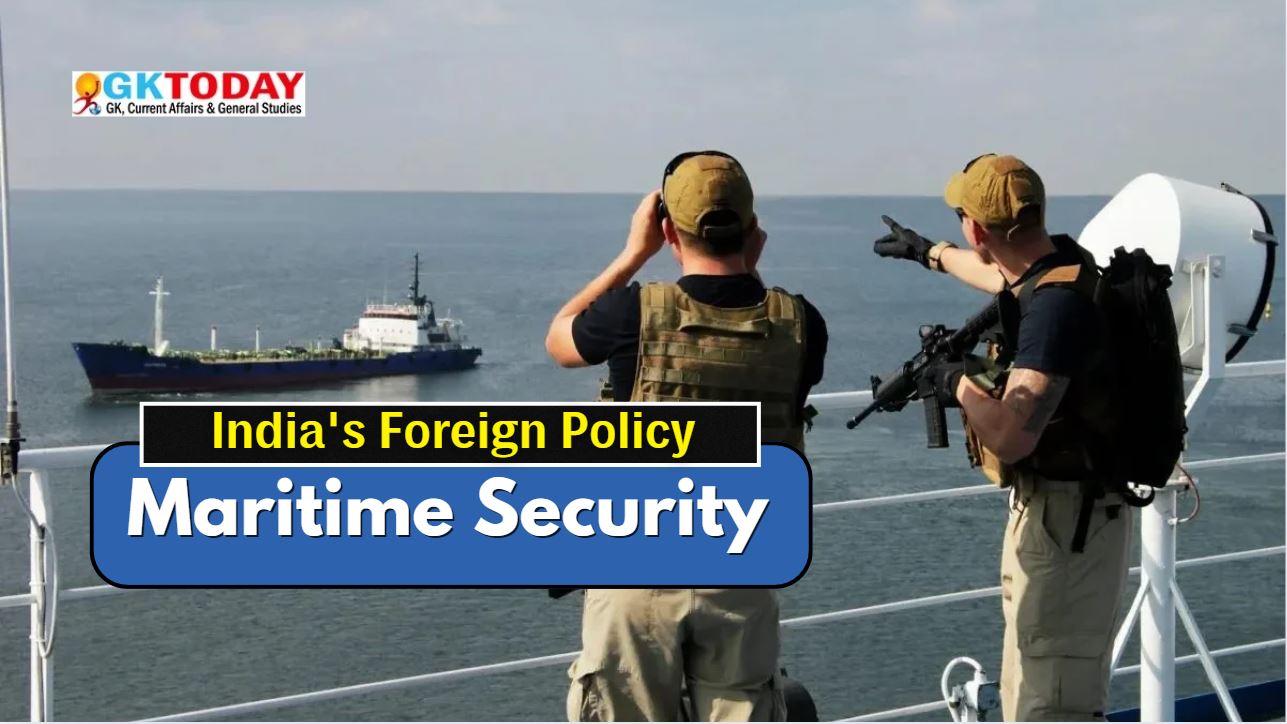Maritime Security – Contemporary Challenges in India’s Foreign Policy [UGC-NTA Net Political Science]
Maritime security plays a very important role in India’s foreign policy, particularly in safeguarding its extensive coastline and maritime interests. With over 7,500 kilometres of coastline and maritime trade, India faces numerous challenges in ensuring the safety and security of its waters.
Definition of Maritime Security
Maritime security refers to the protection of maritime interests against various threats. These include piracy, terrorism, smuggling, and illegal fishing. The key components of maritime security encompass:
- Safety of navigation
- Protection of marine resources
- Safeguarding maritime trade routes
Each component is essential for maintaining a secure maritime environment conducive to trade and economic stability.
Importance of Maritime Security
Maritime security is crucial for several reasons:
- Economic Significance: Over 90% of global trade is conducted via sea routes. Disruptions can have far-reaching economic consequences.
- Strategic Importance: Control of sea lanes is vital for national security and economic stability, ensuring uninterrupted supply chains.
- Environmental Protection: Safeguarding marine ecosystems from illegal activities and pollution is essential for sustainable development.
These factors underline the necessity of robust maritime security measures.
Threats to Maritime Security
Maritime security faces numerous threats, each impacting the safety of maritime operations:
Piracy
Piracy remains threat in regions such as the Gulf of Aden, Strait of Malacca, and West Africa. It elevates shipping costs and insurance rates, compelling nations to invest heavily in security measures.
Terrorism
Terrorist attacks on maritime infrastructure, including ports and ships, pose severe risks. Additionally, maritime routes are often exploited for smuggling arms and drugs.
Smuggling and Trafficking
Illegal activities, such as human trafficking and drug smuggling, occur via sea routes. These practices undermine regional security and law enforcement efforts.
Illegal Fishing
Illegal fishing depletes marine resources, adversely affecting local economies and ecosystems. It poses a direct challenge to food security and sustainable fishing practices.
Environmental Threats
Environmental issues, such as oil spills and marine pollution, threaten marine biodiversity. Climate change further exacerbates these challenges, impacting maritime security.
Regional Maritime Security Frameworks
India’s maritime security strategy is closely tied to regional cooperation. Key frameworks include:
Indian Ocean Region (IOR)
The IOR is vital for India’s trade and energy security. Regional cooperation is facilitated through forums like the Indian Ocean Rim Association (IORA), promoting collaborative efforts.
ASEAN Maritime Security
ASEAN nations work collectively to address disputes in the South China Sea and combat piracy. This cooperation enhances regional stability and security.
Gulf of Aden
International naval coalitions operate in the Gulf of Aden to combat piracy. These partnerships are essential for maintaining safe shipping lanes.
India’s Maritime Security Strategy
India’s approach to maritime security is multi-faceted and includes:
Maritime Doctrine
India’s maritime doctrine emphasises securing sea lanes, protecting maritime interests, and enhancing naval capabilities. This framework guides operational strategies.
Naval Modernization
The Indian Navy is undergoing expansion, acquiring advanced submarines, aircraft carriers, and surveillance systems. This modernisation enhances operational readiness.
Coastal Security
Initiatives like the Coastal Security Scheme focus on improving surveillance and response capabilities along the coastline. This is critical for deterring illegal activities.
International Cooperation
India engages in joint exercises with countries like the USA, Japan, and Australia, exemplified by the Malabar Exercise. Participation in regional security dialogues encourages collaboration.
Legal Frameworks
Legal frameworks govern maritime rights and responsibilities, ensuring compliance and dispute resolution.
United Nations Convention on the Law of the Sea (UNCLOS)
UNCLOS provides a comprehensive framework for maritime governance, outlining rights and responsibilities of states. It plays important role in resolving maritime disputes.
International Maritime Organization (IMO)
The IMO sets global standards for shipping safety, security, and environmental performance. Compliance with these standards is vital for maintaining maritime security.
Technological Aspects
Technological advancements enhance maritime security capabilities.
Surveillance Technologies
The use of satellites, drones, and Automatic Identification Systems (AIS) enables effective monitoring of maritime activities. These technologies improve situational awareness.
Cybersecurity
Protecting maritime infrastructure from cyber threats is increasingly important. Cybersecurity measures safeguard critical systems from potential attacks.
Challenges in Maritime Security
Maritime security faces several challenges that hinder effective implementation:
Geopolitical Tensions
Disputes in the South China Sea and India-China maritime rivalry create instability. These tensions complicate regional cooperation and security efforts.
Resource Constraints
Limited naval resources and funding hinder the implementation of comprehensive maritime security initiatives. Budgetary restrictions affect operational capabilities.
Coordination Issues
Effective maritime security requires coordination among various agencies, including the navy, coast guard, and customs. Improved collaboration is essential for successful operations.
Future Directions
To enhance maritime security, several future directions can be pursued:
Enhanced Regional Cooperation
Strengthening partnerships with neighbouring countries for joint maritime security operations is crucial. Collaborative efforts can address common threats effectively.
Capacity Building
Training and equipping regional navies to tackle maritime threats is essential. Capacity building initiatives enhance overall regional security.
Sustainable Practices
Promoting sustainable fishing and marine conservation efforts is vital for long-term security. Environmental stewardship is integral to maritime security strategies.
Key Organizations and Initiatives
Several organisations and initiatives play a central role in maritime security:
Indian Navy
The Indian Navy is at the forefront of maritime security operations. Its strategic capabilities are essential for safeguarding national interests.
Coastal Security Scheme
This initiative aims to enhance coastal surveillance and security measures. It is a critical component of India’s maritime security strategy.
National Maritime Security Policy
The policy provides a comprehensive framework for maritime security strategy. It outlines objectives, responsibilities, and collaborative approaches. Thus, maritime security is a critical aspect of India’s foreign policy, necessitating robust measures to address contemporary challenges. The strategic importance of maritime routes, coupled with various threats, demands a multifaceted approach involving regional cooperation, technological advancements, and legal frameworks. As India navigates its maritime security landscape, enhanced collaboration and sustainable practices will be key to ensuring a secure maritime environment for future generations.



Monica
July 21, 2015 at 2:32 pmCan we Incorporate a Chit Company in one State and carry on chit fund business across all States in South India.
Ho k
April 28, 2018 at 11:44 amNo